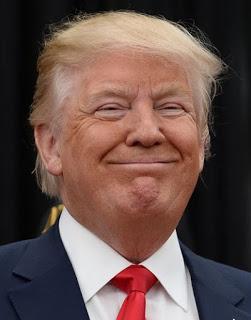 (Photo of Donald Trump, from Time.com, is by Anthony Behar / Sipa USA/AP.)
(Photo of Donald Trump, from Time.com, is by Anthony Behar / Sipa USA/AP.)Is Donald Trump crazy enough to shut down the border between the United States and Mexico. He has threatened to do that before and not followed through. But he seems to be more serious this time, even to the point of mentioning a time frame for it to happen (this week).
I still think it's probably an empty threat -- designed to convince his followers that he is a strong leader. But he's not very bright, and obviously has some mental problems. It's just possible that those might let him actually follow through on his threat this time.
He obviously doesn't realize that closing the border would be an economic disaster. It might salve his bigoted and xenophobic personality (and that of his followers), but it would damage the economy.
Here's just a tiny part of a good article by Dara Lind at Vox.com on the Trump threat:
Shutting down ports of entry would be an economic disaster. It would also disrupt the lives of border communities that rely on the flow of people between the US and Mexico — including the major cities of San Diego (and Tijuana) and El Paso (and Ciudad Juarez). Approximately $1.5 billion worth of commerce happens along the US-Mexico border every day. Nearly half a million people cross the border legally every day through Texas ports alone. Even reductions in port capacity or temporary shutdowns tend to lead to panic among the business community and local residents. El Paso is currently concerned that already-long waits at the ports could get longer as agents are reassigned to care for unauthorized migrants. When the San Ysidro port of entry in San Diego shut down for a few hours in November, as agents responded with force (including tear gas) to an organized march of asylum seekers, the temporary closure cost about $5.3 million in lost business revenue. Of course, making it harder for people to cross legally generally only encourages people to cross illegally — something that’s already been seen as the US has limited the number of asylum-seekers it allows to present themselves at ports. Trump’s Friday tweets actually tacitly acknowledge that drug smuggling is more likely to happen at ports than between them — something he generally explicitly lies about. But drug smugglers are less likely than, say, banana exporters to just throw up their hands if a port is shut down, rather than finding other illegal ways to get drugs into the US. Every time Trump tweets something like this, border-state legislators and business associations react with alarm. Generally, DHS officials stress that they understand the importance of keeping the ports open. But Trump by all appearances does not. It’s not that “shutting down the border” is the administration’s only proposed solution — Homeland Security Secretary Kirstjen Nielsen wrote a letter to Congress on Thursday asking for changes to the law regarding family detention and child deportation, and predicting that they would need more funding. But it’s an idea Trump himself can’t let go of. And now, for the first time — if for completely different reasons — there is an actual prospect that the administration will do somethingthat looks vaguely similar to Trump’s threats.

